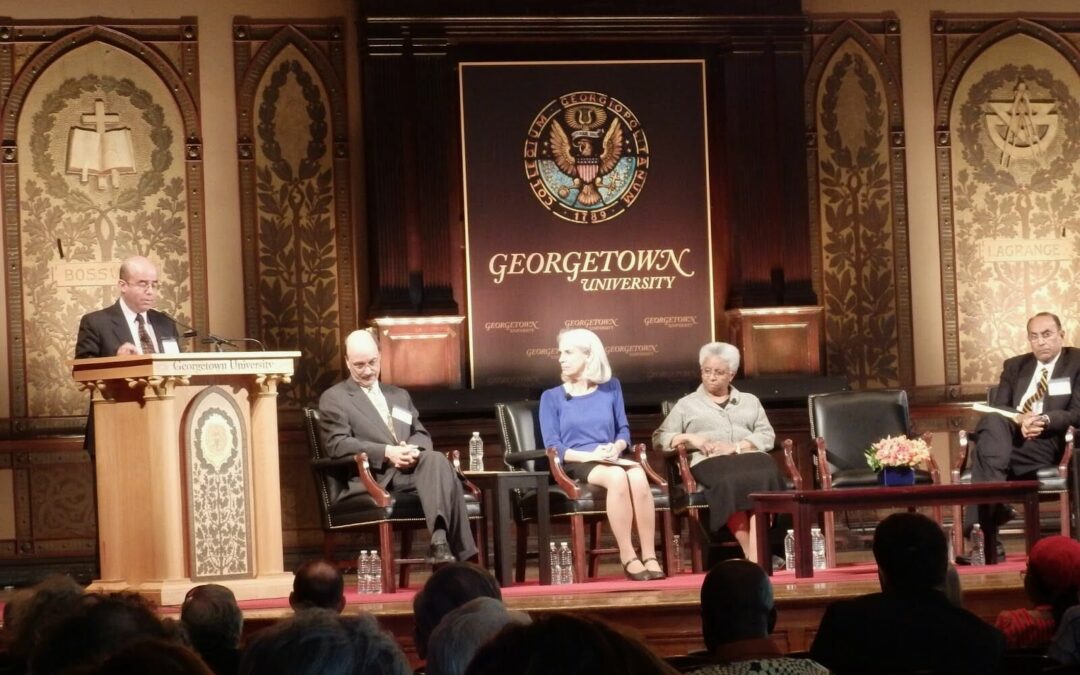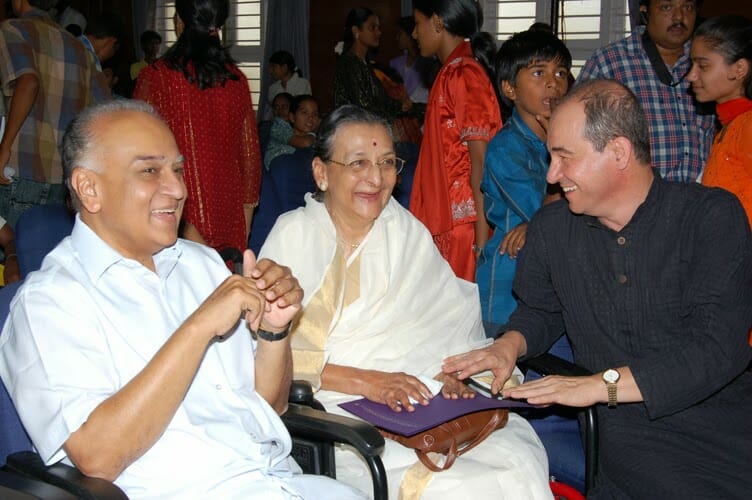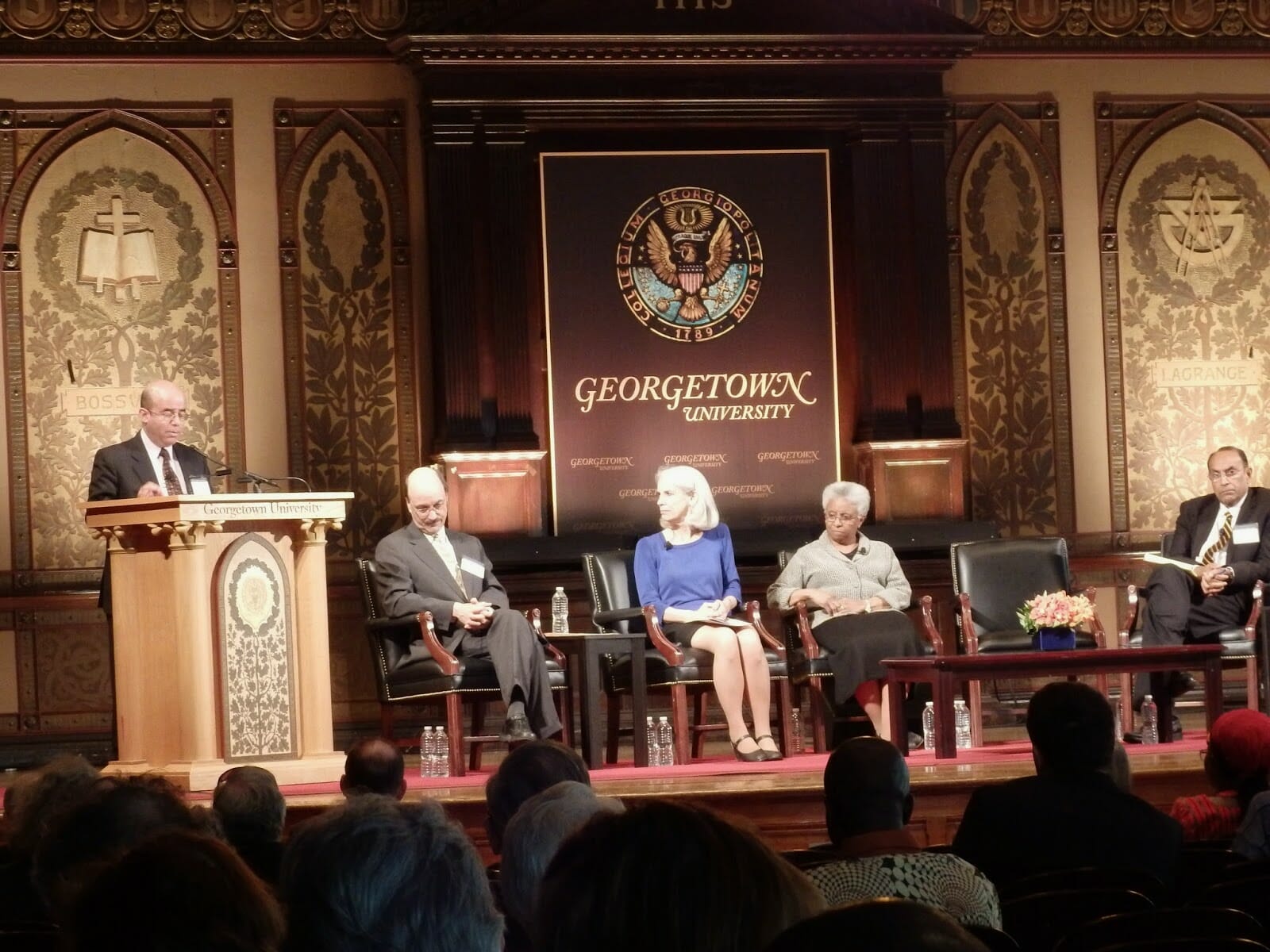Poland: Christian-Muslim Dialogue in Katowice
 In Poland, with its population of 38 million, 90% of whom are Christian, the Muslims are a religious minority. They number 25 thousand, 0.08% of the population. Their presence presence back to the Tartars of the 14th century; then there was the immigration of the second half of the 20th century and the years after the Berlin wall. The recent day of dialogue is inserted amongst three major events in the ongoing dialogue amongst Christians and Muslims in Poland. Father Adam Was, from the Polish Catholic Bishops Conference’s Committee for non-Christian Religions, describes the event: The Day of Islam in the Catholic Church in Poland, instituted in 2000 by the Polish Catholic Bishops Conference at the request of the Mixed Council of Catholics and Muslims, is celebrated each year on June 26; also the Prayer of Peace and Justice in the World, begun in the aftermath of September 11, 2001, promoted by Polish Tartars; and finally “the unprecedented event,” as described by Mufti Nedal abu Tabaq, the “Christians Amongst Muslims in Poland,” established on May 29, 2015 and begun three years ago by the Muslim League in Poland. Fifty guests were invited to speak at the event, invited by Imam Abdul Jabbar Koubaisy, Director of the Centre and vice-president of the Muslim League in Poland: local civil authorities, representatives from the Catholic, Orthodox and Lutheran Churches; representatives from the University of Silesia and from the Jewish Community of Katowice. Focolare president, Maria Voce, and co-president Jesús Morán were the guests of honour.
In Poland, with its population of 38 million, 90% of whom are Christian, the Muslims are a religious minority. They number 25 thousand, 0.08% of the population. Their presence presence back to the Tartars of the 14th century; then there was the immigration of the second half of the 20th century and the years after the Berlin wall. The recent day of dialogue is inserted amongst three major events in the ongoing dialogue amongst Christians and Muslims in Poland. Father Adam Was, from the Polish Catholic Bishops Conference’s Committee for non-Christian Religions, describes the event: The Day of Islam in the Catholic Church in Poland, instituted in 2000 by the Polish Catholic Bishops Conference at the request of the Mixed Council of Catholics and Muslims, is celebrated each year on June 26; also the Prayer of Peace and Justice in the World, begun in the aftermath of September 11, 2001, promoted by Polish Tartars; and finally “the unprecedented event,” as described by Mufti Nedal abu Tabaq, the “Christians Amongst Muslims in Poland,” established on May 29, 2015 and begun three years ago by the Muslim League in Poland. Fifty guests were invited to speak at the event, invited by Imam Abdul Jabbar Koubaisy, Director of the Centre and vice-president of the Muslim League in Poland: local civil authorities, representatives from the Catholic, Orthodox and Lutheran Churches; representatives from the University of Silesia and from the Jewish Community of Katowice. Focolare president, Maria Voce, and co-president Jesús Morán were the guests of honour.  ”Interreligious dialogue is a necessary condition for peace in the world, and so it is a duty for Christians as well as other religious communities” (EG, 250), recalled Metropolitan of Katowice, Archbishop Wiktor Skwore, in his message that was ready by Father Tadeusz Czakański, the Metropolitan’s delegate for the dialogue with Islam. And focusing in on the theme of the meeting, he underscored how: the foundation of the entire teaching of Jesus Christ lies in merciful love towards one’s neighbour,” and he wished that this interreligious meeting in Katowice would help all “to live more deeply the mystery of God’s Mercy” and that “it would contribute to a greater openness towards one another, to more efficient cooperation on the ground in caring for the marginalised and oppressed.” Then, in her speech, Maria Voce recalled some passages of the Christian Scriptures that speak of Jesus even before his birth, highlighting his concrete love towards the human person. “It was this universal love, without reservations that has fascinated everyone who belongs to the Focolare, and it has become our rule of life,” the Focolare president noted. One of Chiara Lubich’s intuitions, which constitutes one of the fundamental points of her spirituality of unity, was the discovery of the Jesus’ commandment par excellence: ‘This is my commandment: love one another as I love you. No one has greater love, to lay down one’s life for one’s friends” (Jn 15:12-13). “Loving in this way is not always easy,” Maria Voce admitted, “at times, or very often this love towards our brother or sister requires sacrifice and fatigue. . . But also here Jesus is the model: he loved to the point of giving his life for us.” In concluding, she expressed her wish that: God, “the greatest and most merciful, would help us to look upon everyone with the gaze of a brother or sister, with the measure of love that he revealed to us, so that together we can build a world that everyone is waiting for where brotherhood and true peace reign.” While speaking of Jesus Christ, Mufti Nedal Abu Tabaq, who is responsible over all the Imams in Poland, affirmed that in the Koran it is written that “Jesus is the sign”. “He was not only miraculously conceived, but he also performed miracles, cured the sick, raised the dead. Each one of us must resuscitate the light in those who suffer (. . .) We are not candles that can burn out; we are the fire that is already come forth from it, and this light is present in every human being, but we must revive it, make it emerge (. . .) in the needs, as Jesus Christ had done (. . .) This is the Jesus whom I love, whom I know, whom I praise.” Common action in favour of interreligious dialogue: the threat against the value of the family and the need, as believers, to protect it; educating children in dialogue: these were a few of the issues that were dealt with in a fraternal dialogue with Maria Voce and Jesús Morán, during the second part of the programme. The programme concluded with the Lord’s Prayer recited by Christians and the Dua recited by Muslims. There was a sign of peace, expressed in a handshake or embrace celebrating the fraternal love that was experienced in those hours amongst Christians, Muslims and Jews.
”Interreligious dialogue is a necessary condition for peace in the world, and so it is a duty for Christians as well as other religious communities” (EG, 250), recalled Metropolitan of Katowice, Archbishop Wiktor Skwore, in his message that was ready by Father Tadeusz Czakański, the Metropolitan’s delegate for the dialogue with Islam. And focusing in on the theme of the meeting, he underscored how: the foundation of the entire teaching of Jesus Christ lies in merciful love towards one’s neighbour,” and he wished that this interreligious meeting in Katowice would help all “to live more deeply the mystery of God’s Mercy” and that “it would contribute to a greater openness towards one another, to more efficient cooperation on the ground in caring for the marginalised and oppressed.” Then, in her speech, Maria Voce recalled some passages of the Christian Scriptures that speak of Jesus even before his birth, highlighting his concrete love towards the human person. “It was this universal love, without reservations that has fascinated everyone who belongs to the Focolare, and it has become our rule of life,” the Focolare president noted. One of Chiara Lubich’s intuitions, which constitutes one of the fundamental points of her spirituality of unity, was the discovery of the Jesus’ commandment par excellence: ‘This is my commandment: love one another as I love you. No one has greater love, to lay down one’s life for one’s friends” (Jn 15:12-13). “Loving in this way is not always easy,” Maria Voce admitted, “at times, or very often this love towards our brother or sister requires sacrifice and fatigue. . . But also here Jesus is the model: he loved to the point of giving his life for us.” In concluding, she expressed her wish that: God, “the greatest and most merciful, would help us to look upon everyone with the gaze of a brother or sister, with the measure of love that he revealed to us, so that together we can build a world that everyone is waiting for where brotherhood and true peace reign.” While speaking of Jesus Christ, Mufti Nedal Abu Tabaq, who is responsible over all the Imams in Poland, affirmed that in the Koran it is written that “Jesus is the sign”. “He was not only miraculously conceived, but he also performed miracles, cured the sick, raised the dead. Each one of us must resuscitate the light in those who suffer (. . .) We are not candles that can burn out; we are the fire that is already come forth from it, and this light is present in every human being, but we must revive it, make it emerge (. . .) in the needs, as Jesus Christ had done (. . .) This is the Jesus whom I love, whom I know, whom I praise.” Common action in favour of interreligious dialogue: the threat against the value of the family and the need, as believers, to protect it; educating children in dialogue: these were a few of the issues that were dealt with in a fraternal dialogue with Maria Voce and Jesús Morán, during the second part of the programme. The programme concluded with the Lord’s Prayer recited by Christians and the Dua recited by Muslims. There was a sign of peace, expressed in a handshake or embrace celebrating the fraternal love that was experienced in those hours amongst Christians, Muslims and Jews.



